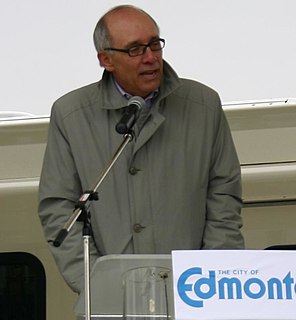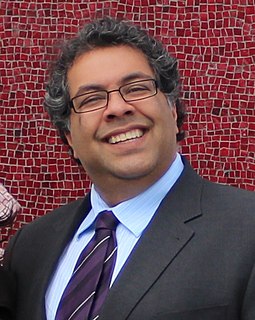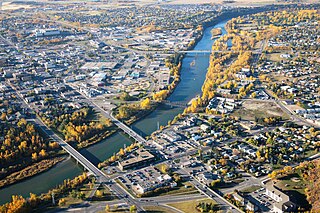The Calgary City Council is the legislative governing body that represents the citizens of Calgary. The council consists of 15 members: the chief elected official, titled the mayor, and 14 councillors. Naheed Nenshi was elected mayor in October 2010 as the city's 36th. Each of the 14 councillors represent one of the city's 14 wards.
Red Deer was a provincial electoral district representing the city of Red Deer, Alberta in the Legislative Assembly of Alberta from 1905 to 1986. The district was split into Red Deer North and Red Deer South in 1986.
The Lethbridge City Council is the legislative governing body that represents the citizens of Lethbridge, Alberta. Eight councillors and the mayor comprise the council. The mayor is the city's chief elected official and the city manager is its chief administrative officer. For the 2017–2021 term, the mayor is Chris Spearman and the councillors are Mark Campbell, Jeff Carlson, Jeffrey Coffman, Belinda Crowson, Blaine Hyggen, Joseph Mauro, Rob Miyashiro, and Ryan Parker.

Morris Flewwelling, was the mayor of the City of Red Deer, Alberta, from 2004 to 2013. He was a long time alderman on Red Deer City Council prior to being elected mayor.

Municipal elections were held in Alberta, Canada on Monday, October 15, 2007. Since 1968, provincial legislation has required every municipality to hold triennial elections. Mayors (reeves), councillors (aldermen), and trustees were elected to office in 15 of the 16 cities, all 111 towns, all 99 villages, all 4 specialized municipalities, all 64 municipal districts, 3 of the 7 improvement districts, and the advisory councils of the 3 special areas. The City of Lloydminster is on the Saskatchewan schedule, and held elections on October 25, 2006 and October 28, 2009, while 4 improvement districts have no councils and are led solely by the Minister of Municipal Affairs. Since the 2004 municipal elections, the Town of Lac La Biche and Lakeland County amalgamated to form Lac La Biche County, the villages of Irricana and Onoway became towns, the Town of Brooks became a city, and the Village of Sangudo was dissolved.
Edson was a provincial electoral district in the Canadian province of Alberta represented in the Legislative Assembly of Alberta from 1913 to 1986.
Clover Bar is a former Alberta provincial electoral district.

The 2010 Edmonton municipal election was held Monday, October 18, 2010 to elect a mayor and 12 councillors to the city council, seven of the nine trustees to Edmonton Public Schools, and the seven trustees to the Edmonton Catholic Schools. Two incumbent public school trustees had no challengers. Since 1968, provincial legislation has required every municipality to hold triennial elections.

Municipal elections were held in Alberta, Canada on Monday, October 18, 2010. Since 1968, provincial legislation has required every municipality to hold triennial elections. Mayors (reeves), councillors (aldermen), and trustees were elected to office in 16 of the 17 cities, all 108 towns, all 95 villages, all 5 specialized municipalities, all 64 municipal districts, 3 of the 7 improvement districts, and the advisory councils of the 3 special areas. The City of Lloydminster is on the Saskatchewan schedule, and held elections on October 28, 2009 and October 24, 2012, while 4 improvement districts have no councils and are led solely by the Minister of Municipal Affairs. Since the 2007 municipal elections, the villages of Derwent, Kinuso, New Sarepta, and Thorhild were dissolved, the Municipality of Crowsnest Pass changed from town to specialized municipality status, and the Town of Lacombe became a city.
The 2007 Red Deer municipal election was held Monday, October 15, 2007. Since 1968, provincial legislation has required every municipality to hold triennial elections. The citizens of Red Deer, Alberta, elected one mayor, eight councillors to the Red Deer City Council, the seven Red Deer School District No. 104 trustees, and five of the Red Deer Catholic Regional Division No. 39's seven trustees. Of the 61,445 eligible voters, only 13,282 turned in a ballot, a voter turnout of 21.6%, and an average of 6.3 aldermen per ballot.
The 2010 Red Deer municipal election was held Monday, October 18, 2010. Since 1968, provincial legislation has required every municipality to hold triennial elections. The citizens of Red Deer, Alberta, elected one mayor, eight councillors to the Red Deer City Council, the seven Red Deer School District No. 104 trustees, and five of the Red Deer Catholic Regional Division No. 39's seven trustees. Based on the mayoral vote turnout, of the estimated 59,942 eligible voters, the voter turnout was 23.9%.

Municipal elections were held in Alberta, Canada on Monday, October 21, 2013. Mayors (reeves), councillors (aldermen), and trustees were elected to office in 16 of the 17 cities, all 108 towns, all 93 villages, all 5 specialized municipalities, all 64 municipal districts, 3 of the 8 improvement districts, and the advisory councils of the 3 special areas. The City of Lloydminster is on the Saskatchewan schedule (quadrennial), and held elections on October 24, 2012, while 5 improvement districts have no councils and are led solely by the Minister of Municipal Affairs. Since the 2010 municipal elections, portions of Lac La Biche County and the Regional Municipality of Wood Buffalo formed Improvement District No. 349, and the villages of New Norway and Tilley were dissolved. From 1968 to 2013, provincial legislation has required every municipality to hold elections every three years. The Alberta Legislative Assembly passed a bill on December 5, 2012, amending the Local Authorities Election Act. Starting with the 2013 elections, officials are elected for a four-year term, and municipal elections are moved to a four-year cycle.

The 2013 Calgary municipal election was held Monday, October 21, 2013, to elect a mayor and 14 councillors to the city council, the seven trustees to the Calgary School District, and five of the seven trustees to the Calgary Catholic School District. Two incumbent separate school trustees had no challengers. From 1968 to 2013, provincial legislation required every municipality to hold elections every three years. The Legislative Assembly of Alberta passed a bill on December 5, 2012, amending the Local Authorities Election Act. Starting with the 2013 elections, officials are elected for a four-year term, and municipal elections are held on a four-year cycle.

The 2013 Edmonton municipal election was held Monday, October 21, 2013 to elect a mayor and 12 councillors to the city council, seven of the nine trustees to Edmonton Public Schools, and the seven trustees to the Edmonton Catholic Schools. Two incumbent public school trustees had no challengers. From 1968 to 2013, provincial legislation has required every municipality to hold elections every three years. The Legislative Assembly of Alberta passed a bill on December 5, 2012, amending the Local Authorities Election Act. Starting with the 2013 elections, officials are elected for a four-year term, and municipal elections are moved to a four-year cycle.
The 2013 Lethbridge municipal election was held Monday, October 21, 2013 to elect a mayor and eight councillors (at-large), the seven Lethbridge School District No. 51 trustees, and five of the Holy Spirit Roman Catholic Separate Regional Division No. 4’s nine trustees. This election marks a change of title for council members, from "Alderman", to "Councillor".

The 2013 Strathcona County municipal election was held Monday, October 21, 2013. From 1968 to 2013, provincial legislation has required every municipality to hold elections every three years. The Alberta Legislative Assembly passed a bill on December 5, 2012, amending the Local Authorities Election Act. Starting with the 2013 elections, officials are elected for a four-year term, and municipal elections are moved to a four-year cycle.

The 2013 Regional Municipality of Wood Buffalo municipal election was held Monday, October 21, 2013. From 1968 to 2013, provincial legislation has required every municipality to hold elections every three years. The Alberta Legislative Assembly passed a bill on December 5, 2012, amending the Local Authorities Election Act. Starting with the 2013 elections, officials are elected for a four-year term, and municipal elections are moved to a four-year cycle.

The 2017 Calgary municipal election was held on October 16, 2017, to elect a mayor, councillors to the city council, trustees to the Calgary Board of Education, and trustees to the Calgary Catholic School District. From 1968 until 2012, Alberta municipal elections had been held every three years. In 2012, however, the Alberta Legislative Assembly amended the Local Authorities Election Act to add a year to the cycle making terms four years. In addition, council members are now referred to as councillors, whereas they used the title "Alderman" prior to 2013. Advanced voting began on October 4 and ran through until October 11.

The 2017 Edmonton municipal election was held Monday, October 16, 2017 to elect a mayor and 12 councillors to the city council, the nine trustees to Edmonton Public Schools, and the seven trustees to the Edmonton Catholic Schools. One incumbent public school trustee had no challenger so was elected by acclamation; for the other eight balloting was conducted. They were all elected to four year terms. Since 2013, provincial legislation has required every municipality to hold quadrennial elections. The voter turnout was 31.5% with 194,826 ballots cast out of the 618,564 estimate eligible voters.









